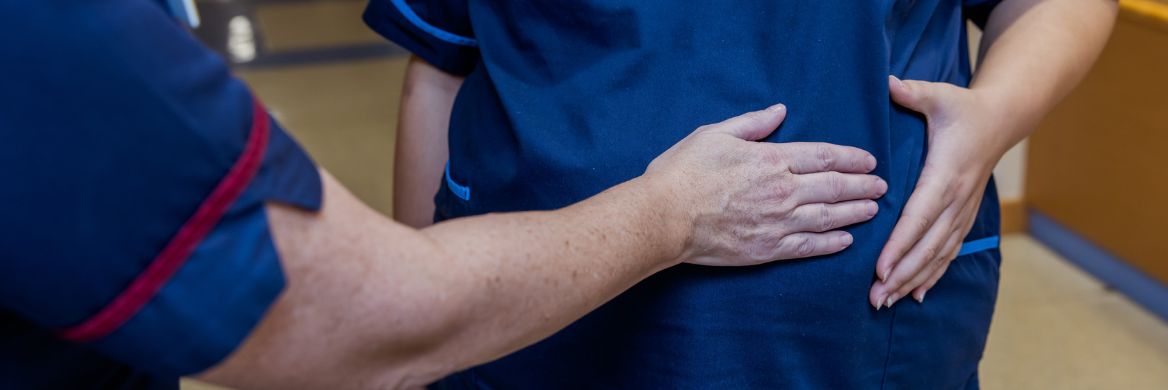
The Maternity Urgent Assessment Unit (MUAU) at Heartlands Hospital cares for women from 16 weeks of pregnancy and up to six weeks following the birth of your baby who have an urgent clinical concern relating to pregnancy, birth and six weeks following the birth of your baby. Your care will be tailored to your individual care plan or needs.
The Maternity Urgent Assessment Unit is a newly built area with two spaces for assessment and seven rooms for treatment. You will be seen according to clinical need and there are no appointments for this service.
It is staffed by experienced midwives and maternity care assistants; they will refer to doctors if needed after discussing this with you. As part of our Maternity Urgent Assessment Unit, we have our Day Assessment Unit.
The Maternity Urgent Assessment Unit is found on the ground floor of the Princess of Wales Women's Unit at Heartlands Hospital. Please visit the reception desk on arrival.
Reasons to come to MUAU
Reasons to attend MUAU include the following:
Baby movements
If at any time you feel your baby is moving around less often or slowing down or has changed the pattern of their movements please visit at once.
Abdominal pain
While it’s normal to have slight contractions through pregnancy (this is when you feel your stomach go tight and then soft) if you experience a sudden, sharp on-going pain that won’t go away, or your stomach is continuously hard please call and come in as soon as possible.
Bleeding
Whilst bleeding in pregnancy can occur, it can also be a sign that something is wrong, especially if it is with pain. If you are 16 weeks or less, please go to A&E. If you are over 16 weeks pregnant, please call and come to the Maternity Urgent Assessment Unit at once.
Severe itching
While itching is common in pregnancy, severe itching without a rash (particularly in the last four months of pregnancy) can be a sign of a potentially serious liver disorder. Please ring the Maternity Urgent Assessment Unit and ask for advice and they will ask you to come in for a blood test and assessment.
Swelling
This is can be normal in pregnancy as you have an increased blood volume which can go to the extremities such as your hands and feet. However, if there are any sudden changes, call and come to the Maternity Urgent Assessment Unit as it could be a sign of pre-eclampsia – high blood pressure and fluid retention in pregnancy.
Vaginal discharge
A discharge that is smelly or bloodstained may point to infection, please ring the Maternity Urgent Assessment Unit and ask for advice.
Headaches, dizziness or visual disturbances
Headaches may suggest that you are dehydrated or could be due to hormonal changes in pregnancy. However, if you have a headache with visual disturbances this could be due to a change in your blood pressure which could be serious in pregnancy, please contact the Maternity Urgent Assessment Unit for further advice.
Diarrhoea, vomiting or high fever
Any sudden illnesses, especially a high temperature, please ring the Maternity Urgent Assessment Unit for advice.
Labour
If you think you are in labour, please call your community midwife or the Maternity Urgent Assessment Unit for guidance when your contractions are in a regular pattern, lasting at least 60 seconds, come every couple of minutes, or if you are having regular pains before 37 weeks or if you are worried about your baby.
Spontaneous ruptured membranes (waters breaking)
If you think that your waters are broken, please put on a maternity pad to assess the amount and colour of the water and phone the Maternity Urgent Assessment Unit for advice.
Postnatal (after birth) wound concerns
If you think that you have a possible infection, an issue or concern with a wound healing (vaginal tear or caesarean birth) please do not delay and come straight into the Maternity Urgent Assessment Unit for assessment where you will be assessed.
What to bring with you
- Always bring your handheld records if you have them or something with your hospital number on. You can also access your hospital number on the Badgernet app.
- Bring something to do or read, drink or eat in case you have to wait for results or to see the doctor.
- Please note that children are not allowed into the unit.
- The length of your stay and the staff looking after you will depend on the assessment needed. You should allow 1 - 4 hours.
Appointment times are not given. Women are seen on a priority basis.
Within this information, we may use the terms "woman" and "women". However, we recognise that not only people who identify as women may want to access this content. Your care should be personalised, inclusive and sensitive to your needs, whatever your gender identity.
Last reviewed: 22 August 2025